
Atlas F1 Editor in Chief
Having settled into their Parisian dinner, after the sizzling appetizers of 'Tyre Gate', Sauber and tyre testing, Atlas F1's Biranit Goren continues her prodding of Michelin's head of competition Pierre Dupasquier on all things Formula One. This week, he tells her about the wonders of Ferrari, the politics and rivalry, and the memories of Enzo. There's more courses served next week... Exclusive for Atlas F1
And while our table gets filled with plates of yummy dishes whose name I can't pronounce - let alone remember - I ponder just how confident Dupasquier is that his company's tyre is the best in Formula One today.
BG: Let's say hypothetically that I could go into the pits and take a set of Michelin tyres and put a 'Bridgestone' sticker on them and put them next to Michael Schumacher's car, and in the morning the Ferrari mechanics would put those tyres on Michael's car, and he goes out. I realise this is not possible, but humour me: what would happen?
Dupasquier thinks long before replying. "He will feel the tremendous grip that Bridgestone doesn't have. They know it, they admit it. Now, to take 100% advantage of this extra grip, we may have to... I still believe Ferrari have a better downforce and aerodynamics and everything. When we had competition in the 1980s, cars with a good aerodynamic - like Colin Chapman's - and cars like Ferrari's, without any aerodynamics at that time, it was not the same tyre. On cars with good aerodynamics, with good downforce, we could not use qualifying tyres anymore. We had to build, they qualified with race tyres. So Michael [Schumacher] will feel a very important difference, it will be faster - but not necessarily that faster, unless we make a small adjustment."
BG: So you yourself believe the Michelin tyre on Ferrari will be faster and that your tyre is better than Bridgestone's
Dupasquier: "Oh yes, definitely, yes. Absolutely. And our partners [feel that way] as well - if not, they would just say 'hey guys, what are you doing in Formula One?' They will look at Bridgestone, trying to get them, and Bridgestone is pushing like hell trying to get one or two more teams of a good level, particularly Japanese obviously."
BG: OK, so that begs the question - why don't you partner with Ferrari?
Dupasquier Thinks for a while. "When Michelin decided to make a return to Formula One, my first reaction, the first move on my part, was to say 'let me call Jean Todt, we have to have Ferrari'. And we did talk and we had a few meetings, and two things didn't work. One, Ferrari wanted a tyre supplier that would concentrate 100 percent on them and not on others. We already had a commitment [to other teams] so there was no way to do that. And in addition Ferrari said, 'we have such a great visibility around the world that you should pay us a lot to have the privilege to put your tyres on our nice machines'. To be honest, I think they are right to say that."
BG: Does Bridgestone pay them?
Dupasquier: "Oh yes. A lot. And I don't disagree with Ferrari's position - and frankly that point was not as important as the first issue: we could not accept and I didn't want to obey the order of Ferrari to work for them, period."
BG: In retrospect, was that a good decision? You couldn't know, when you returned to F1, that Ferrari are going to be dominant for so many years
BG: And they didn't
Dupasquier: "No. On the contrary... I mean, If you look at what Rubens [Barrichello] has been doing, if you take his results this year, you can see he is always up there, and without Michael [Schumacher] he would be the World Champion anyway, because he's always there. So that gives you an indication where Ferrari are. The others - sometimes McLaren, sometimes Williams, sometimes BAR, sometimes Renault... pfft! They absolutely haven't got the capability today - McLaren and Williams did it in the past, but today they don't show the capability of exerting 100% of the potential on every track, every day.
"Look at what Ferrari are doing, it just amazes me. At Melbourne, the first race this year - a new car, the F2004, did a few kilometres, Michael showed in Imola [in pre-season testing] that compared to the F2003-GA, the new car is one second faster immediately. So OK, we know it's a good car, very well. But then they flew to Melbourne. Friday morning, first session, unknown circuit - a circuit where you don't have a lot of data, you don't test in Melbourne. Michael waits while everybody else is doing one lap, installation lap, coming back, making some changes. Then, 25 minutes after the beginning of the first session, he stepped into the car, did the first lap, didn't stop, then pushed on the car, did one timed lap - and this first lap in Melbourne was the reference of the day. If I remember correctly, he did 1:25.1 - two seconds faster than the pole last year.
"OK, so what does that mean? When you talk about physics, about mechanics, about engineering - to be in a position to achieve that kind of thing is enormous. Ferrari did not touch any setup on the car, did not touch any aerodynamics device, not suspension, nothing. You can see others in the box with springs and stuff - I mean, it's a total disaster. I'm not saying others are not doing a good job, I'm saying it's part of the game - to adjust the car, to fine tune it, that's fine, we all love it. But those guys [at Ferrari] don't need it. They bring the machine out of the plane, they open the box and bang! It's absolutely... I still don't understand it."
BG: And how do they do it?
Dupasquier: "Well, [technical director] Ross Brawn said: 'we have a simulation system that's so good, that when we touch one part of the car we can immediately detect all that has to be done on the entire car to keep the same balance'. Yes, that's the proof. I trust him. He's right."
BG: When you describe it like this, I'm thinking 'wow, they're amazing'. But I don't feel in the paddock that people admire Ferrari at all - it always seems like others are trying to diminish their achievements.
BG: In Monza? How so?
Dupasquier: "Because Ferrari, when it was dry, just repeated the times they did in testing [a week before]. We did not. We lost a second somewhere, we don't know where. On all our cars. For one car or one team you could say they didn't adjust the setup properly, but for everybody? So it's clear we... we try to understand, and we work hard to understand; it's very interesting. The day we understand that, we'd have a big step forward. I mean... we lost a second! We don't know what happened, and I can tell you - we're not happy at all."
BG: So how do you find out? How do you analyse something like this and find out?
Dupasquier thinks for a while, then points his finger up.
BG: Pray to God?
Dupasquier: "No, Looking at the timing screen!"
BG: Oh...
Dupasquier: "You know what happened in qualifying, you know how much fuel was in the car, so the times from qualifying are an indication of the potential. And then you see that the Ferraris are doing 21.2, 21.0, 20.4, and you look at your best cars - 22.9, 23.1, 23.2 - and you think, what's going on? Then you look at it carefully afterwards and you just find out that you are out of pace."
BG: And there is no way for you to actually pinpoint where you went wrong? To find out exactly?
Dupasquier: "Well, that's our job. Sometimes it's obvious. This time, why didn't we reproduce in the racing the performances we had before? Temperatures changed? No; they were the same. Night brought water in the ground? Yes, we know it; fine. But that didn't affect Bridgestone, so what are the other reasons?"
BG: Certainly in qualifying [for the Italian GP] you were very fast - [Juan Pablo] Montoya set the fastest lap ever in first qualifying. So the biggest difference was actually in the race itself, and as you yourself once told me, things change in the race.
Dupasquier: "Yes, they do, but not that much!"
BG: The thing is, it was not the first time it happened to Michelin this year...
BG: OK... so what happened in Belgium, where three times a rear right Michelin tyre exploded?
Dupasquier: "We did not find any fact in the process that could suggest that some tyres were weaker. I sent my people to the track right after the race, and they inspected the kerb at the entry to Bus Stop. It's a normal standard FIA kerb, but when you looked at the top, it had a step of 60 millimetres of raw concrete. You put your hand on it, and you hurt yourself. And it was all black, so people went there. If on the right hand turn, your left wheel is on the track, the right tyre unloaded, but you go further and you pass that step. Then you have to come back, and coming back, the internal sidewall of your tyre goes over that... so that's why."
BG: I heard that when your people inspected the track, they found Bridgestone technicians taking samples, and there was a fight there...
Dupasquier: "Oh, that wasn't in Spa, that was during the Monza testing."
BG: What happened?
Dupasquier: "When Michael Schumacher exploded the tyre in front of the pits - paaah! - bits of tyre was everywhere. Our guy was working on the track, and a Bridgestone guy came over telling him, "let me see your pocket!" Our guy replied, "you want to see what?? My pocket?" But they were both joking. More important was [what happened] in Spa. We lost part of the tread of Button's [failed tyre], and we haven't found it since. The tread has been rolled and put by the marshal and by the truck driver on the Minardi, because he was bringing the Minardi back to the pits. The truck driver said, 'I gave the tyre to this guy from Minardi', and that guy said, 'I didn't see anything'. So I think somebody... OK, I shouldn't say anything."
BG: OK, I will ask you this: what would you gain if you got a tyre of Bridgestone, and what would Bridgestone gain if they got a tread or a tyre from Michelin? What is there to gain from it?
Dupasquier: "It will give a good explanation of the results - why did it work and why did it not work."
BG: Because you can analyse the compound?
Dupasquier: "Oh, absolutely, everything."
BG: Is it that hard to find an F1 tyre?
Dupasquier: "Impossible!"
BG: Really? I would have thought I could have bought it from you!
Dupasquier: "We have guards 24 hours on them..."
BG: You in fact shred all the tyres, you don't leave anything
Dupasquier: "Yes, it's done absolutely carefully making sure that no one piece can go to your competitor."
Dupasquier: "It's not the case at all. We're not in conflict at all with the FIA, we just try to listen, to understand, and we ask Charlie [Whiting] questions, a lot of questions. We want to know. If they put us in a situation that we don't understand, then we don't know what to do."
BG: But do you feel like others in the paddock, that there's an FIA bias towards Bridgestone, because they are partners with Ferrari?
Dupasquier: "Oh, definitely! It's obvious. Max [Mosley] doesn't hide the fact that without Ferrari there's no Formula One."
BG: But does that translate into the day-to-day activity? They accommodate them more?
Dupasquier: "I don't suspect it, but... since Ferrari is a dominant force in Formula One, the FIA cannot neglect Ferrari and the best options should come from the best team. Definitely when you have a partner like Ferrari today, you definitely turn to them to make decisions. It seems normal to me."
BG: At some point last year, you suspected that Ferrari or Bridgestone are using different compounds on the front and the back. Correct?
Dupasquier: "I wouldn't say suspect, we just observed that sometimes things are not reflecting what they're supposed to. There are many things that happen. You remember in Suzuka last year? When their tyre is a hard tyre, and all of a sudden the tyre is fast, you say, 'what's going on?' Bridgestone knows, and everybody knows, and we know, that you have chemical products that you can put on the tyres to make them fast for three laps. So yes, the rumour is there. Always. Anything can be done!"
BG: I remember you saying there's a funny smell from the Ferrari tyres...
Dupasquier: "Yes. Sometimes they are shiny, and sometimes they are not shiny anymore - you can suspect anything, because it's not forbidden by the rules. The rules don't say anything about it. We asked the question and the FIA said, 'no, don't do it!' But you read the book - it's not in the book."
BG: Let's say that Bridgestone had a tyre that, if you measured the tread width after the race it would be more than 270mm, and let's say that Williams or McLaren told the FIA about it. Would the same thing have happened as it did last year after Hungary?
Dupasquier Laughs. "That's a tricky question, thank you very much! And you expect me to answer?"
BG: Well, I guess you just did...
Dupasquier: "Well, yeah, partly I answered. If you are not red and you ask questions, you are in a different position. But it makes sense!"
BG: Maybe, but according to you it also makes your job harder
Dupasquier: "Yes, it does. But Ferrari are part of Formula One - they are the present and the past. At the same time, the others are a part of Formula One but at a lower level. That's the fact of life. And yes, it's tough. But until our partners feel we don't give them what they expect, it's fine for us."
BG: What would be sweeter for you personally - to win with Ferrari, or to beat Ferrari?
BG: Oh? How come?
Dupasquier: "The first thing was his name. When I was a child, my father was crazy about cars. He was not a rich man, and for some reason for me Ferrari was a kind of a myth. Years later, when I was in Michelin and in charge of Italy and Spain for technical situations, I wasn't very happy to see Ferrari using rubbish tyres from the competitors. So part of my challenge was to meet Enzo and see what's going on. We developed tyres for rallying, for Citroen, 15 inches, and it was the same size of some of the Ferrari models. So I called Ferrari and said, 'I'd like to offer you something that we had developed, high performance tyres'. And he said, 'come over any time you want'.
"So I went over to see Ferrari with our test driver, and we brought the tyres we developed for Citroen. We placed the tyres on a Ferrari - it was looking crazy; the rim was too wide for the tyre, it was not the right size. So we did a small lap and at the end the Commendatore said, 'Please return as soon as you can with the right size of tyre.' We said, 'yes sir!' and left. It took us exactly one year on the day to develop the right tyre, and I returned - alone this time - with four tyres of the right size.
"One thing I vividly remember: they had a test route in the mountain on top of Maranello. I was sitting besides the test driver in a Ferrari, and I remember an old lady preparing salad on the side of the road, and she didn't even turn her head towards us - us, brilliant people in a Ferrari, driven to perfection! I was so shocked by that! Afterwards I realized she was just probably fed up with Ferraris driving by every 10 minutes, every day!
"Anyway, then we came back and the Commendatore was holding his purple pen, writing small notes. The car was standing on a road made from pebbles, standing in neutral, and it was making the most horrible noise - the tyre was noisy. And I remember the Commendatore saying 'the tyre is good, but the rumorosita is a problem' - rumorosita.
BG: That's 'loudness' in Italian
Dupasquier: "Yes, and ever since then I've never forgotten that word! So he asked what we could do to get rid of the 'rumorosita', and I told him, 'I'm sorry but in the short-term, if we do anything to the tyre to try and get rid of the noise, we will lose at the same time all the advantages of the tyre. So for the time being, it's either with rumorosita or nothing'. He said, 'thank you very much' and goodbye. Three weeks later, my boss got an order for tyres from Ferrari. The boss called me and yelled at me, 'what did you do?' - we weren't ready for production - and I said 'look, I did not promise him anything. We just tested. You are absolutely free to write him a letter and say no way'. Of course, he never wrote that letter - and we supplied the bloody tyre to Ferrari!"
BG: What do you think Enzo would have thought about the team today?
Dupasquier: "Well... he was a racer, he was a fighter... The team today may go a bit further than he went himself, in the dedication to use any possible trick to win. But he was a fighter, a charger, so he would probably tell Jean Todt - 'I wouldn't have done the same things but yes, it's a good job.'"
BG: In fact, you know Jean Todt from the days he was a co-driver in Rally
"In the [2002] Austrian Grand Prix, when there was all this mess [about Ferrari's team orders], I saw people in the crowd trampling on Michael's caps, they were so pissed. But then you asked Jean Todt, and he said, 'you expect me to give up one point for Michael? And if at the end of the Championship we'd lose it by one point - who will give us a hard time?' And he was finished, that's it. Very clear. He had no doubt about it, nothing."
BG: And you agreed with him?
Dupasquier: "I don't behave the same way. But I have absolutely no right, no position to judge him."
BG: What about Michael Schumacher? What's your impression of him?
Dupasquier: "Oh, the guy is fast, and I love watching to see how he does things."
BG: Would you want him to retire? Clear the way? Everyone has an opinion if they want Schumacher to retire or not!
Dupasquier: "Well there's one small problem - he's such a great Champion that I hope for him to feel what's going on before it's too late. And that's the trick."
BG: Well, there seem to be two schools of thought in F1 - those that believe it would be best for the sport if Schumacher retires at the top, and those that say it will be better if he is beaten before he leaves. Where do you stand?
Dupasquier: "I don't understand how people can hope that he will be destroyed, ripped off, matched before leaving. He is the Champion!"
BG: Well, let's not go too far - he doesn't have to be destroyed
Dupasquier: "No, no, if you don't win you are destroyed. It would be a disaster for him."
BG: For him maybe, but what about the sport?
Dupasquier: "Who cares about the sport? The people count more!"
BG: Well, Ron Dennis doesn't agree with you. He wants Michael to stay so he can beat him...
BG: Still, many thought the advantage of Michelin in 2003 will blow away Ferrari in 2004
Dupasquier: "It's not enough; Ferrari felt the wind of the cannonball, as we say in French. But they restructured themselves, they pushed Bridgestone like hell, they reconstructed Bridgestone, they forced them - they admit they made a big mistake with the narrow tyre [in 2003], and Bridgestone came out in the beginning of this season with the wide tyre at the front, which was absolutely normal. That proves on one side the arrogance from Ferrari to force Bridgestone to work for them alone and to do what they want. But at the same time, they proved their capability in remaining modest - saying 'we screwed up' and changing their mind, which is smart."
BG: On the night before you left for China, I asked you what you thought was going to happen in China and you said it will be like Melbourne, that Michael Schumacher will go out and will do the best lap of the day. As it turned out, he had a horrible weekend and in fact by Brazil, Ferrari were not as dominant as before. And I'm wondering, if for you that's a sign of things to come in 2005
Dupasquier: "Well, first of all, nobody's perfect. But it also suggests that the structure of Michael on top with Ferrari backing him - that structure one day or another will fail somehow or somewhere. So in all honesty, in order to beat Ferrari next year, we need for something to go wrong with Ferrari's structure."
BG: So you're saying that in Brazil you didn't win, Ferrari lost?
Dupasquier: "Yes, absolutely. They lost for two reasons - one was Michael not being at his normal position, and the second one is that the Bridgestone tyre was not doing a good job. But I wouldn't read too much into it - if there's anything we learned in 2004, it's that Ferrari can sort themselves out very quickly!"
BG: So you think that 2003 was a one-time chance for you to win the World Championship, and you missed it?
Dupasquier: "No, I hope not! Anything can happen. That's life, and you never know..."
Pierre Dupasquier strikes me as the archetypical French gentleman - he loves women, wine, good food and fast cars. And if it wasn't for all those funny sounds that he makes instead of words - aaah, ooh, baaaam, bang!, wham, or brrrrr - he'd be an Italian.
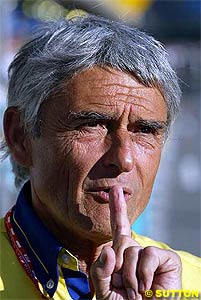 The staff at the Parisian restaurant fuss about our table, bringing a selection of wine for Dupasquier to try out, and given that the reservations were under the name of Michelin, I'm amused by the thought that they think Pierre is actually the restaurant critic for the famous Michelin guide.
The staff at the Parisian restaurant fuss about our table, bringing a selection of wine for Dupasquier to try out, and given that the reservations were under the name of Michelin, I'm amused by the thought that they think Pierre is actually the restaurant critic for the famous Michelin guide.
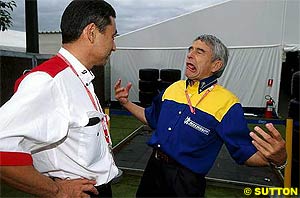 Dupasquier: "It was obvious already then, I said it - and I wrote it at that time - Ferrari was already 1.5 seconds faster than Williams, our main partner at that time. And I said 'uh, oh'. I logically hoped that Williams, a strong and competent and experienced team, will recover that 1.5 seconds gap rapidly."
Dupasquier: "It was obvious already then, I said it - and I wrote it at that time - Ferrari was already 1.5 seconds faster than Williams, our main partner at that time. And I said 'uh, oh'. I logically hoped that Williams, a strong and competent and experienced team, will recover that 1.5 seconds gap rapidly."
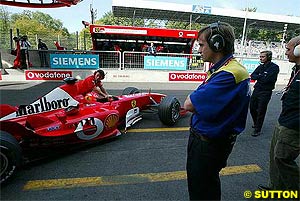 Dupasquier: "Well, these people are in competition, they don't like to lose. It's a pain in the neck, if to be polite, to see Ferrari first and second. Impossible. In Monza [at the Italian Grand Prix], I was so pissed that for the first time in my life, when Michael passed [Jenson] Button, I took my headphones off and went to have a beer. But it was our fault, we didn't do a good job."
Dupasquier: "Well, these people are in competition, they don't like to lose. It's a pain in the neck, if to be polite, to see Ferrari first and second. Impossible. In Monza [at the Italian Grand Prix], I was so pissed that for the first time in my life, when Michael passed [Jenson] Button, I took my headphones off and went to have a beer. But it was our fault, we didn't do a good job."
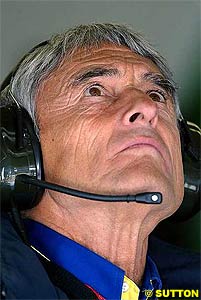 Dupasquier: "No, it wasn't. And we should understand why. The tyre was absolutely consistent, no problem, but not fast enough. The track was not the same, and we could say 'oh, the track changed' - it rained all night, it rained in the morning, it was a mess, Porsche went on track... fine. But it affected us and not the others. 1:22.2 was our fastest car - it should have been 21.2, and even less. Montoya was capable with an empty car to do 1:19 in the first qualifying. So we need to understand what happened to our tyre in the race. [Jenson] Button, [Antonio] Pizzonia - they didn't have any problem. So we need to figure out what happened."
Dupasquier: "No, it wasn't. And we should understand why. The tyre was absolutely consistent, no problem, but not fast enough. The track was not the same, and we could say 'oh, the track changed' - it rained all night, it rained in the morning, it was a mess, Porsche went on track... fine. But it affected us and not the others. 1:22.2 was our fastest car - it should have been 21.2, and even less. Montoya was capable with an empty car to do 1:19 in the first qualifying. So we need to understand what happened to our tyre in the race. [Jenson] Button, [Antonio] Pizzonia - they didn't have any problem. So we need to figure out what happened."
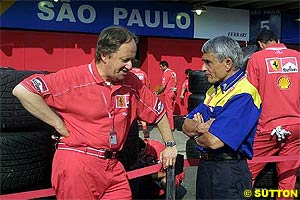 BG: Just to shift the topic a little bit, I have to say I get the impression that ever since Michelin came back to F1, you have been in conflict with the FIA - whether it's about the depth of grooves on used tyres, or the asymmetrical grooves, or 'Tyre Gate' last year - you always seem to be in conflict with the governing body
BG: Just to shift the topic a little bit, I have to say I get the impression that ever since Michelin came back to F1, you have been in conflict with the FIA - whether it's about the depth of grooves on used tyres, or the asymmetrical grooves, or 'Tyre Gate' last year - you always seem to be in conflict with the governing body
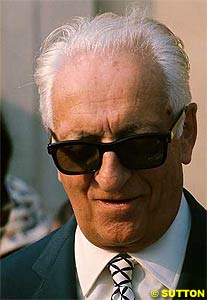 Dupasquier: "With the choice they've done, the position they have, it's to beat Ferrari, definitely. Well, I don't like to say that - we want to beat Bridgestone, not Ferrari. But since Ferrari is now depending on Bridgestone and have made that kind of selection - "we go with Bridgestone alone, they are ours and we govern them" - then I want them to lose for this mistake. But I don't dislike Ferrari, I love Ferrari. We worked with Ferrari for many years, we supply them as well in the road cars, and I miss Enzo - he was the most impressive man I ever met in my career."
Dupasquier: "With the choice they've done, the position they have, it's to beat Ferrari, definitely. Well, I don't like to say that - we want to beat Bridgestone, not Ferrari. But since Ferrari is now depending on Bridgestone and have made that kind of selection - "we go with Bridgestone alone, they are ours and we govern them" - then I want them to lose for this mistake. But I don't dislike Ferrari, I love Ferrari. We worked with Ferrari for many years, we supply them as well in the road cars, and I miss Enzo - he was the most impressive man I ever met in my career."
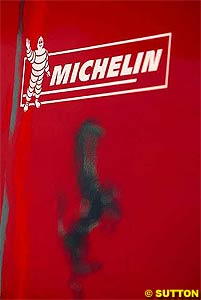 Dupasquier: "Yes. He's a brilliant guy, definitely. Normally when a co-driver stops, you open the door of the car - and it's the middle of the night - and the guy is full of papers everywhere and completely disoriented. You ask him, 'how much time do we have?' And he'll say 'I think 22 minutes, maybe 12'. 'How much gas do you need?' He doesn't know. But with Jean Todt, he would be saying 'I have 12 minutes and 30 seconds and you need to put 50 litres, period.' That was it. Oh god, he was definitely a kind of computerised head. Straight, precise. I don't know, he's a man of doing an absolutely professional job in everything.
Dupasquier: "Yes. He's a brilliant guy, definitely. Normally when a co-driver stops, you open the door of the car - and it's the middle of the night - and the guy is full of papers everywhere and completely disoriented. You ask him, 'how much time do we have?' And he'll say 'I think 22 minutes, maybe 12'. 'How much gas do you need?' He doesn't know. But with Jean Todt, he would be saying 'I have 12 minutes and 30 seconds and you need to put 50 litres, period.' That was it. Oh god, he was definitely a kind of computerised head. Straight, precise. I don't know, he's a man of doing an absolutely professional job in everything.
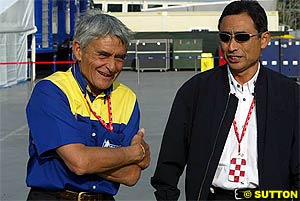 Dupasquier laughs. "I don't agree with him about Michael, but about Ferrari I admit I sometimes feel the same. That's vicious on my part, but I would like them to pay for what they did, for the mistake in selecting a tyre manufacturer only to beat the tyre manufacturer up, making sure it works only for them. So that's a mistake and I would like them to pay for it. And we missed the boat last year. They gave it to us, they screwed up everywhere - Michael screwed up himself, making mistakes and everything - and because of the non-consistency of our teams, we lost. They gave it to us on a plate! Shit! That's ridiculous."
Dupasquier laughs. "I don't agree with him about Michael, but about Ferrari I admit I sometimes feel the same. That's vicious on my part, but I would like them to pay for what they did, for the mistake in selecting a tyre manufacturer only to beat the tyre manufacturer up, making sure it works only for them. So that's a mistake and I would like them to pay for it. And we missed the boat last year. They gave it to us, they screwed up everywhere - Michael screwed up himself, making mistakes and everything - and because of the non-consistency of our teams, we lost. They gave it to us on a plate! Shit! That's ridiculous."
Coming Up Next week: Le Fromage et Dessert - Ron Dennis, Frank Williams, Bernie Ecclestone, and the best Michelin driver ever...
|
Contact the Author Contact the Editor |
Please Contact Us for permission to republish this or any other material from Atlas F1.
|
Volume 10, Issue 47
Interview with Pierre Dupasquier (II)
The Banks Vs. Bernie
Bookworm Critique
On the Road
Elsewhere in Racing
The Weekly Grapevine
> Homepage |